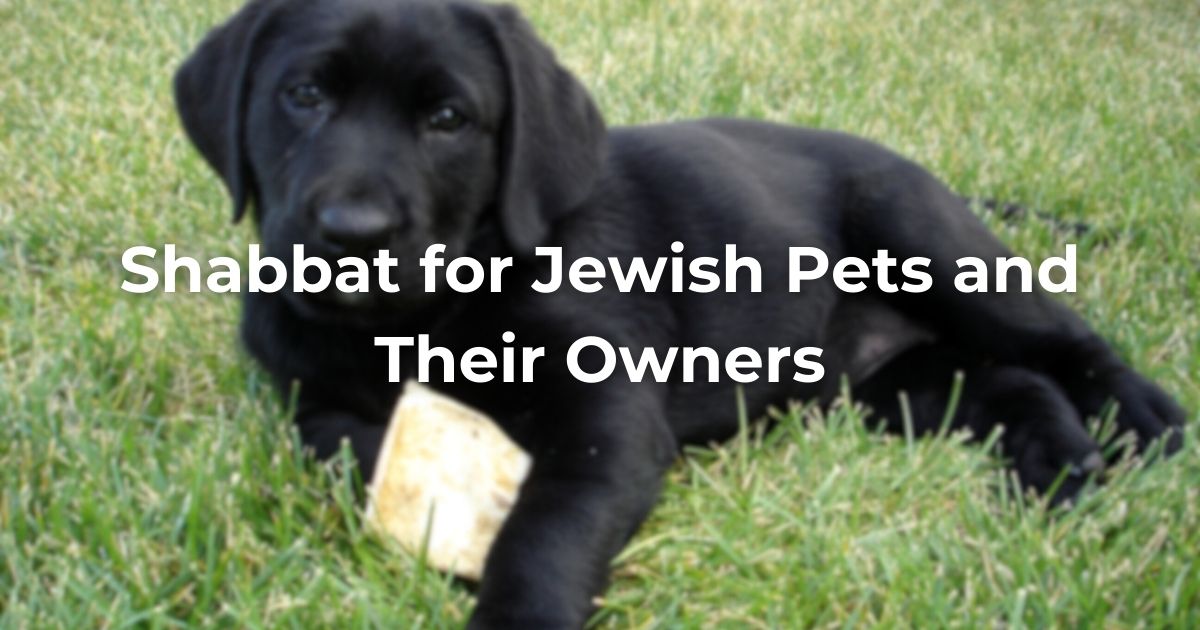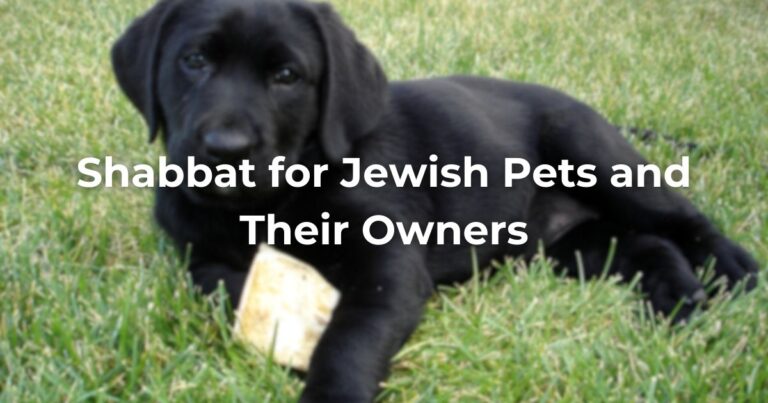Over the course of my childhood, I had seven dogs in my home. I like dogs. Full disclosure: while I grew up with several cats, I am not, nor was I ever a “cat person.” There’s nothing wrong with cats per se, but they’re just not my thing.
Recently my wife and I adopted a black lab named Buddy. He’s a hoot and a half. As we began to fold Buddy into the rhythm of our lives, we felt that some of the things that we did that were distinctly Jewish, were gone. In short, being a Jewish pet-owner does not have a clear road map.
Being Jewish means setting your life to a certain calendar and schedule. Perhaps Shabbat is part of it, perhaps services are. You have a routine in your life for being Jewish.
Being a pet owner is much the same way. Animals know when it is feeding time, they know when it’s bed time. They need that strict schedule. The purpose of this article is to articulate a brief history of pets and Judaism as well as to give some suggestions for things about synthesizing pet life and Jewish life together.
Understanding the Jewish Human-Pet Relationships
There are a few sources indicating very special human-animal relationships. One poignant example is in II Samuel 12. David has just ordered Bathsheba’s husband, Uriah, killed. The prophet, Nathan, comes to rebuke David and offers a metaphor of a poor man who dearly cared for a little lamb.
The Book of Samuel even goes so far as to compare that relationship to a father-daughter relationship. Consider David’s lack of confusion around this relationship. He didn’t question the love between the man and the lamb. From there, we can infer that this type of emotional intimacy was understood by the TorahRefers to the first five books of the Hebrew Bible, the Tanakh, also called the Five Books of Moses, Pentateuch or the Hebrew equivalent, Humash. This is also called the Written Torah. The term may also refer to teachings that expound on Jewish tradition. Read more, by David, and the our ancestors who were hearing this story.
However, the rabbis of the MishnaA collection of rabbinic teachings edited in Israel around 225 CE. Organized in six sedaraim by subject matter and dealing with both ritual and civil law. Both the Jerusalem and Babylonian Talmud are expansive discussions of the Mishnah. Read more and the TalmudReferring to one of two collections, the Jerusalem and Babylonian Talmuds, edited in the 6th century, that contains hundreds of years of commentary, discussion, and exploration of the ideas in the Mishnah. One could describe it as Mishnah + Gemara = Talmud Read more did not understand the familial relationships one might have with an animal. They understood animals to be work animals for plowing a field, or perhaps that animals have a sacrificial or food role. This means that Jewish law and understanding is still adapting to the modernity’s pet model of the human-animal relationship.
Laws for Jewish animal and pet welfare
They did however discuss and create laws surrounding animal welfare. This category of laws is called tza’ar ba’alei chayim. For the pet owner, most of these are moot, for the secular laws surrounding animal welfare fall within the halachic categories of tza’ar ba’alei chayim. Pet owners may not be familiar with this smaller point of Jewish animal welfare obligations. The Talmud says that one’s animals should be fed before you eat your own meal (BT Brachot 40a). So I encourage all Jewish pet owners to take this one step toward fulfilling that obligation.
I want to additionally share how my wife and I incorporate our dog into our Shabbat life.
First, when we sit down to Shabbat dinner, we have a special toy that dispenses treats for Buddy. He loves it. At Shabbat lunch we give Buddy a different treat. We only give him these treats on Shabbat. This serves three purposes: 1) the vet says Buddy needs to lose some weight, so there aren’t so many treats and 2) this is a way for us to make Shabbat even more of a different day for us and 3), what dog doesn’t love treats? It’s a doggy way to celebrate Shabbat.
With my wife being a full-time graduate student and I as a working rabbi, we don’t typically have the energy or the daylight to take Buddy to the local dog park. We find that the best time for this is on Shabbat. So one of us will take Buddy and let him run around and play fetch (he loves balls). Don’t worry, Buddy gets an hour or so of walks during the course of any given day.
I know some rabbinic dog owners that give their dogs some challah. We avoid this, as bread is bad for black labs. That doesn’t stop Buddy sometimes. Like the one Shabbat that we came back from shul and Buddy leapt onto the counter and ate all of our freshly baked challah. We had to use leftover matzah to make motzi (…yum).
When we walk Buddy, we have to pick up his poop. There is a Shabbat prohibition against tying knots. So we put his poop into a baggie and this is the only time in the week that we don’t tie off the top of his bag. Instead we twist the top several times to make sure the droppings stay in the bag and then drop it off in a nearby trash can or dumpster.
Finally, Buddy loves Havdallah. He likes the songs that my wife and I sing and he barks along with it. While we cannot share the grape juice with him, we do share the spice box. Buddy is able to sniff the spices and is able to participate in our rituals.
It was important for my wife and I to find a way to make dog-ownership just a little more Jewish. It brings together the rhythm of pet ownership and the Jewish life cycle. A big part of all of this is to make our family a little more Jewish. Finding ways of making our life more life more Jewish is a means of reminding us that even though we might be alone, that we still have our Judaism to fall back on and to bring us closer to other Jews around the world.
Author
-

Rabbi Alex Hamilton was raised in Oklahoma City at Emanuel Synagogue. He graduated Phi Beta Kappa from Rutgers University, where he served as president of the largest Hillel in North America. He studied for a year of intense learning at Yeshivat Hadar in New York City. He graduated in May 2023 from JTS where he also received a Masters in Hebrew Bible. He is currently serving as an active duty Navy Chaplain in Yokosuka, Japan. He is a USY, Ramah, Nativ, and Conservative Yeshiva alum. He happily married Adeena in September of 2020 and they recently adopted a black lab named Buddy.
View all posts




